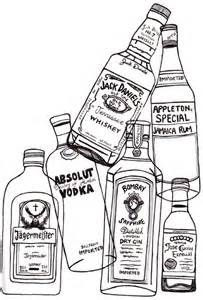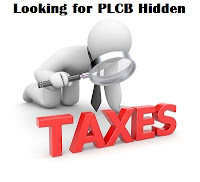Today we are going to look at
Oregon, home of the
Oregon Liquor Control Commission (OLCC), and generally considered to have the
second-highest liquor taxes in the country behind Washington State. They are a
control state for liquor sales, but wine sales are private business.
This chart by The Tax Foundation shows the tax levels for 2016; Oregon appears to have a
tax rate of 3.1 times that of Pennsylvania.
Wow. If we have
high prices, the prices in Oregon must be
astronomical, right? Let's
compare some of the top selling liquors in the two states
today, now that we have the additional wonder of
variable pricing. Keep in mind, the
PLCB's very own report on variable pricing says
nothing about using price negotiation to benefit the citizens, only about
how much more money they can
take from us in
"Revenue."
We're going to
compare the prices for the
top selling spirits in the PA State Stores from 2017 (Fiscal 2018 ended 3 months ago, but the new report
still isn't out) to those same bottles from Oregon, using both state's website prices. We'll give you the
OLCC price, and the PLCB's shelf price (and out the door price). We'll explain that shortly.
First on the list is
Tito's Handmade Vodka. Oregon # 8488B is selling at $23.95. The PLCB has it as # 9359 and it is
on sale this month for $17.99. ($19.07)
Yay us!
2.
Captain Morgan Spiced Rum: Item # 0475BB in Oregon, selling for $16.95. Here it is Item #8865 at $17.99 ($19.07).
3.
Jack Daniel's No. 7: OLCC Item #0146B, which sells for $21.95 (on sale this month); or you can pay
$25.99 ($27.55) for Item #4291 in the State Stores. Such a deal!
4.
Fireball Cinnamon: Oregon item #0939B for $15.95 in plastic, or $17.95 in glass. The PLCB equivalent, #4302, is
on sale for $
17.99 ($19.07). Even on sale they can't match the Oregon price. How much do you reckon they had to
variably mark it up for that to happen?
5.
Jameson Irish Whiskey: Item # 0391B for $29.95 in Oregon; or pay $29.99 ($31.79) for item #7303 in Pennsylvania.
6.
Bacardi Superior Rum: Oregon #6179B is currently selling for $12.95. But
it's on sale at the PLCB! Yeah! Item #7970 is
on sale for $13.99 ($14.83). Wait...what?
7.
Grey Goose Vodka: Oregon's #0636B at $35.95 compares to the PLCB's # 8963, selling for $32.99 ($34.97). Hey,
we won one!
8.
Crown Royal: Oregon's #0311B is going for $27.95 there; but #5186 is selling for $28.99 ($30.73) here. Screwed again.
That's the tale of the tape. Now we'll explain it.
Why did I include the
out the door price for Pennsylvania, but not Oregon? Because there are
no extra or hidden taxes in honest Oregon. The
price you see on the shelf is the
price you pay: no
hidden variable markup, storage fees, extra 1% '
just because' fees, and no sales tax
dumped on top of the already taxed liquor. Kinda makes you wonder about the
"negotiation" on those JD prices in Pennsylvania, doesn't it?
Remember that these are the
largest selling 750s in Pennsylvania*. If there was any
buying power leverage that
could be used, it would be on these items. So what did that
buying power get us? Jack went
up a dollar, as did
Fireball, Bacardi Superior and Crown Royal.
Looks like Oregon has
pretty competitive prices even though their
tax rate is
THREE times as much. How is that possible?
Hidden taxes, with the main one being
product markup, the bloated PLCB "profit" that's being used mainly to pay for bloated PLCB operating costs. It used to be fixed at 30%, but now it is
whatever they need it to be -- that's "variable" pricing! -- to pay off their burgeoning overhead,
incompetent decision making, and of course to maybe pay some of the
pension debt they owe. Need more money?
Just vary the pricing! UPWARD!
You see, in Oregon they just have
taxes, and it's
transparently easy to find exactly what they are. From that they pay for the OLCC's costs. Here in Pennsylvania, we have the super-secret
Variable Markup that
no citizen is allowed to know, used to pay for the
PLCB and whatever
idiocy they come up with:
wine kiosks, house brands,
courtesy training, bad contracts,
renaming stores for the 4th or 5th time...
you get the idea.
Oregon's
listed tax rate may be OVER 3 times that of Pennsylvania, but our
secret taxes make them
almost equal on many, many items. This is what we get with an
"independent" agency with almost no oversight, no experienced business people in charge, and
80 years of cronyism and incompetence at every level. Is this the system that is
best for the citizens? Are you sure we can't do
better by having
real business people run
real businesses in competition with each other for the consumers' dollar? You know...just like you buy
everything else?
Privatize - now more than ever.
* (Oregon does not carry the same bottom shelf vodka that the PLCB does, so that was left off the comparison.)


















